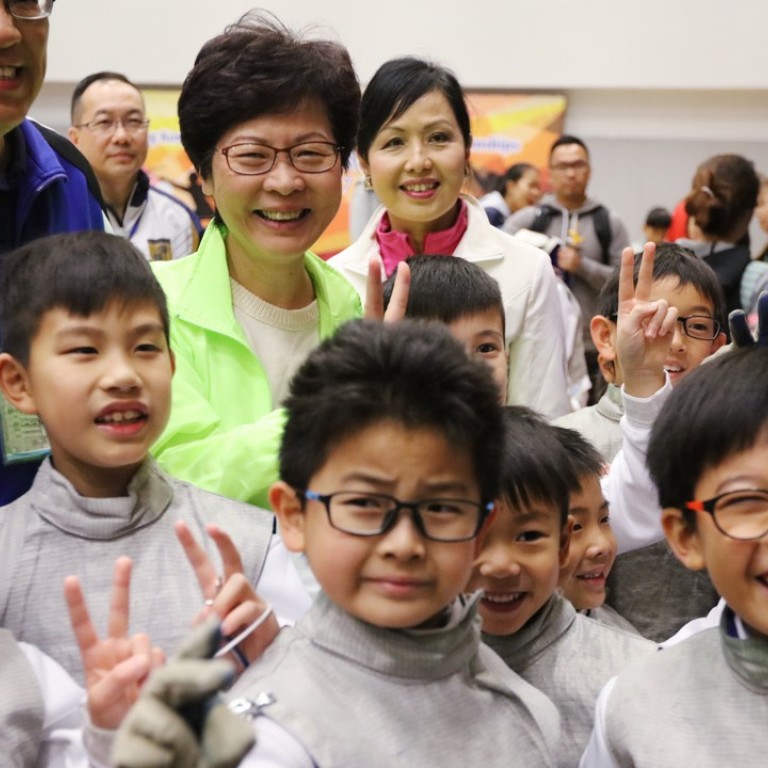
Letters to the Editor, October 17, 2017
Sceptical about Lam’s offer to young people
Mrs Lam proposes to invite more young people to join specified boards and committees through a pilot scheme for self-recommendation.
As well, the government intends to recruit 20 to 30 young people who wish to have a career in policy research, so they get experience in public administration.
This will also lead to the views of young Hongkongers being heard in the higher echelons of the administration.
I have doubts about the ability of Mrs Lam to achieve those aims. And I wonder if young people will be allowed to fully and freely express their opinions on these government bodies. For example, if some youngsters wanted to discuss independence and were forbidden from doing so, what is the point in them being on those committees?
I hope officials will agree that the youngsters who are chosen to join these bodies should be free to talk about any subjects they think are important.
Miki Hui, Tseung Kwan O
Pupils’ high stress levels unacceptable
I am writing about the education initiatives in the policy address, as a teacher and a mother. While they focus on improving teaching and learning, I urge the government to prioritise measures to improve the mental well-being of students.
Children these days are much busier. I can even see stress experienced by my daughter who has just started Primary One. Thanks to the present curriculum, children as young as six are given a lot of difficult homework, and face frequent quizzes and dictation exercises.
It saddens me to see more mothers talking with feelings of frustration and regret after shouting at their kids at home over the issues of homework and revision. So many children don’t get the chance to relax in the playground. I know some of them are under so much pressure they have nightmares.
Learning is important, but it must be effective learning. Children need to be emotionally fit so they can develop the right attitude, which enables them to appreciate learning. The new initiatives announced in the policy address will not free students from stress and anxiety.
Christine Chan, Lai Chi Kok
Cheaper flats scheme makes real difference
So far, it has helped more than 550 people with 100 flats provided by these charitable landlords. It is making a real difference to the lives of underprivileged citizens who have to cope with a society where the rich-poor gap keeps getting wider.
By paying affordable rents, they have more money to spend on, for example, their children’s education, which is very expensive in Hong Kong.
Projects like this can help to create a more harmonious society and I admire the landlords who have joined the scheme. It is good they are willing to lend a helping hand to needy citizens.
I hope we will see an expansion of Light Be with more landlords signing up and renting out properties at below market rates.
Also, if more organisations propose similar schemes, the government should speed up the process of approving them.
Sophia Tam, Yau Yat Chuen
E-payments in taxis should be introduced
I think Hongkongers should be able to make electronic payments in taxis if they wish, because it will be convenient for them and for the drivers.
Paying in real currency can be time-consuming if a lot of change has to be given back, or someone is having to count out small notes and coins.
Also, as more people use e-paymentsm they often leave the house without money now, so adopting this scheme in taxis is an inevitable consequence of the development of new technology.
However, even it is adopted, cabbies should still be happy to take cash payments. Some elderly citizens or visitors from other countries where e-payments are not well developed will prefer to pay the fare with real money and so they must have that option.
Sara Wong Kit-yu, Tseung Kwan O
Traditional beliefs a barrier to act of charity
I think one reason is the traditional Chinese belief regarding self-respect, that it is a loss of dignity to accept charity.
Even needy citizens will feel people will look down on them if they accept a free meal. But, I admire what this woman is doing. I hope she can act as a role model, so that more entrepreneurs will follow her lead and accept their social responsibility.
Zoe Liu Sze-yui, Kwai Chung

